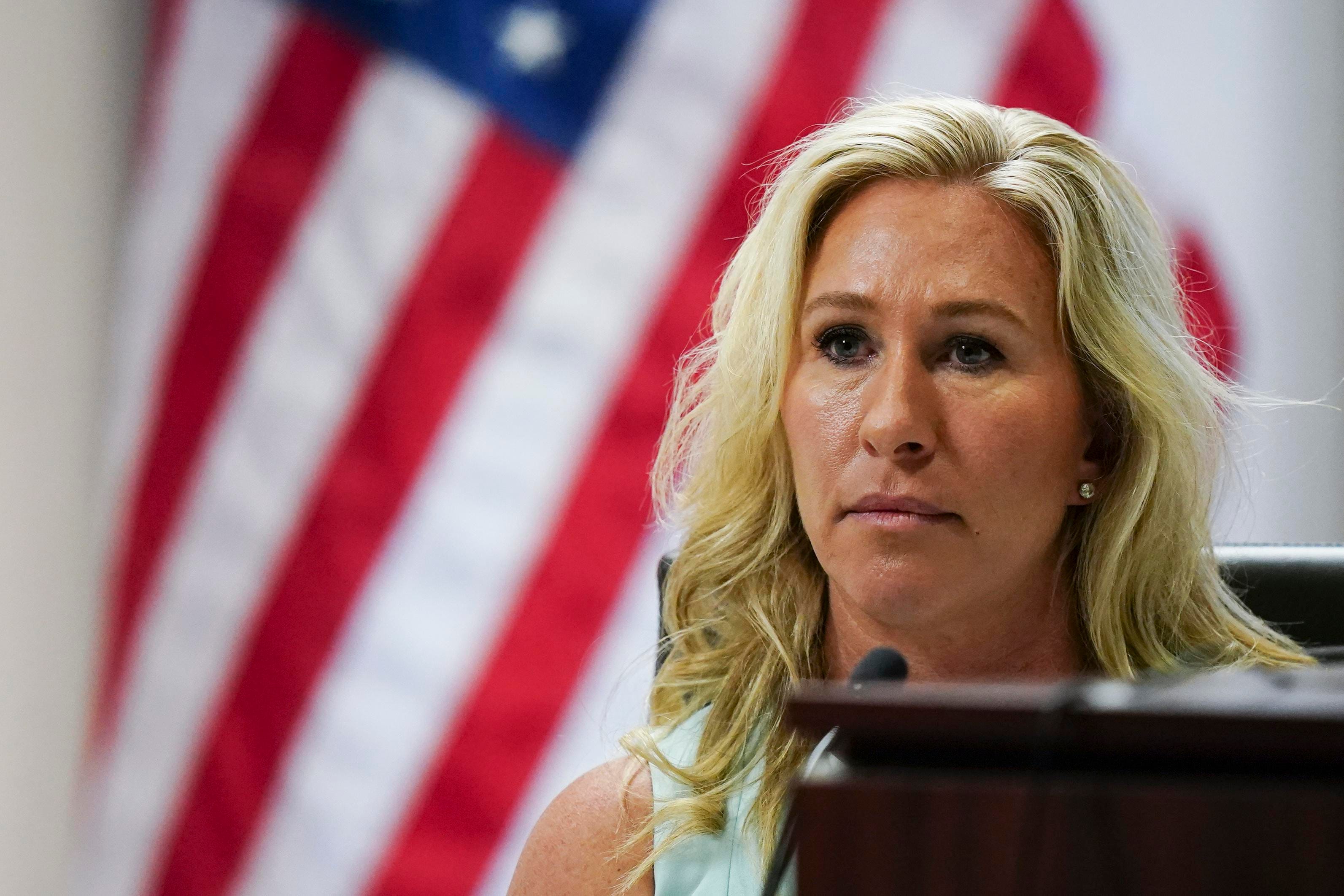Marjorie Taylor Greene ‘Doesn’t Recall’ Any Role In Jan. 6 Capitol Attack

Topline
Rep. Marjorie Taylor Greene (R-Ga.) denied any involvement with the January 6 attack on the U.S. Capitol building and evaded questioning about quotes she had made that alluded to political violence, as she took the stand Friday in a trial to determine whether she should be disqualified from running for reelection for being an “insurrectionist.”
U.S. Rep. Marjorie Taylor Greene testifies at a hearing, Friday, April 22, 2022, in Atlanta.
ASSOCIATED PRESS
Key Facts
Greene was questioned under oath after a coalition of Georgia voters sued in an attempt to disqualify her candidacy under the 14th Amendment, which bars people from holding federal office if they’re insurrectionists, on the basis of her alleged involvement and support for the January 6 riot.
Attorney Andrew Celli, representing the plaintiffs, asked Greene about a series of tweets and statements, including videos, she had made leading up to January 6—both expressing support for the rally and making statements suggesting she could condone political violence—to which the congresswoman largely responded she could not recall making the comments.
Greene said she did not trust CNN when presented with quotes in a piece by the outlet’s about her condoning violence against House Speaker Nancy Pelosi (D-Calif.), for instance, accused videos of her being edited and clipped without context and said about the fact that her Facebook account had “liked” a post saying Pelosi should get a “bullet in the head,” “I have had many people manage my social media account, I have no idea who liked that.”
The congresswoman also denied any support for the January 6 attack and said she only supports “peaceful protest,” and denied that her statement saying January 6 would be “our 1776 moment” was not intended to suggest it should be violent.
Greene’s attorney James Bopp argued that Greene was herself a “victim” of the January 6 attack because she was at the Capitol as it was taking place and so could not have supported it—and denied that it was an “insurrection” to begin with—and argued she should not be barred from running based on speech protected under the First Amendment.
Chief Critic
The plaintiffs argue that Greene’s social media statements are a clear indication of her support for the January 6 attack, saying insurrections are no longer carried out through the military but “through social media and the mass media.” “Words that could have one meaning…can carry very difference significance to the people swimming in that particular subculture,” attorney Ron Fein said Friday. “The most powerful witness against Marjorie Taylor Greene’s candidacy, the most powerful witness in establishing that she crossed the line into engagement of insurrection is Marjorie Taylor Greene herself.”
Surprising Fact
Greene’s supporters present at the hearing Friday included Rep. Matt Gaetz (R-Fla.), and her supporters frequently broke out into applause, forcing the administrative law judge to stop them and say, “This is not a show.”
What To Watch For
Under Georgia law, the administrative law judge hearing the case will issue a ruling within 30 days on whether Greene should be barred from running. That decision is non-binding, however, and it’s ultimately up to Georgia Secretary of State Brad Raffensperger—a Republican who strongly opposed former President Donald Trump’s claims of voter fraud in the 2020 election—to decide Greene’s fate based on the court’s ruling.
Tangent
Greene, who has been repeatedly linked to the baseless QAnon conspiracy theory, invoked it during the hearing Friday, telling Celli he had “as many conspiracy theories as QAnon.” When Celli followed that up by asking whether she believed in the fringe theory, Greene responded, “No, I did not say that I believe in QAnon.”
Key Background
Georgia voters in Greene’s congressional district, backed by advocacy group Free Speech for People, filed a complaint with Georgia Secretary of State Brad Raffensperger in March alleging Greene “voluntarily aided and engaged in an insurrection” and that disqualifies her from serving in Congress. The 14th amendment states “no person” can serve in Congress who, after taking an oath of office, “engaged in insurrection or rebellion against” the U.S. government or “[gave] aid or comfort to the enemies thereof,” which the plaintiffs allege Greene did by promoting the January 6 hearing on social media and allegedly meeting with organizers. Greene had sued to block the legal proceeding from moving forward, but a district court judge threw out her lawsuit, allowing Friday’s hearing to move forward. Free Speech for People is also moving forward with a separate challenge to Rep. Madison Cawthorn (R-N.C.) and his candidacy, which is now before a federal appeals court after a district judge sided with Cawthorn.
Further Reading
Georgia Voters Sue To Block Marjorie Taylor Greene From Running For Being An ‘Insurrectionist’ (Forbes)
Legal Bid To Disqualify Marjorie Taylor Greene From Running For Re-Election Can Continue, Judge Says (Forbes)


